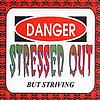There is an old saying that “there is no rest for the wicked.” But how about, “there is no rest for the holy?”
God may have rested on the seventh day, but for a growing number of his ministers, there is more work- – and stress- – than ever, and less chance to unwind. This has led to all sorts of health problems among clergy, from a lack of exercise and a rise in obesity to problems of depression and substance abuse and all the many ills of modern life that pastors spend so much time helping their congregants tackle.
David Gibson, Religion Reporter for Politics Daily, tackles this topic in his article No Rest For the Holy: Clergy Burnout a Growing Concern. He raises three concerns:
The congregation’s expectation of ministers. Some congregants have high expectations of the minister. They expect them to always be there when they need them.
There is a deep concern about stress. Rabbis today are expected to be the C.E.O. of the congregation and the spiritual guide, and to never be out of town if somebody dies. And reply instantly to every e-mail. – Rabbi Joel Meyers, former executive vice president of the Rabbinical Assembly.
The minister’s expectation of the minister. The minister has high expectations of him/herself, but ends up paying the price for this. In trying to be all things to all people they become unhealthy spiritually and physically, and in the end are no longer useful to their Church.
The health of the minister. Ministers often eat on the run and the food is often unhealthy. Functions they attend are likely to have food which is not always healthy, but the minister is expected to eat. Several Methodist preachers in the US told researchers from Duke Clergy Health Initiative “Doughnuts will be the death of me.” [In Tasmania: Curried egg sandwiches!?]
When surveys (in the US) show us that a high percentage of clergy are overweight or obese and that support groups are being set up for clergy who are suicidal, depressed or overwhelmed….that’s a warning sign, we need to respond and we need to act!!

For ministers, the secret is for them to provide balance in their own life by:
- Setting boundaries,
- Taking care of themselves
- Attending to their family
- Sitting down to eat a healthy meal
- Finding time to exercise or relax
- Saying ‘NO’ to some requests
For the congregation, they need to:
- Remember that ministers are not super-human
- Remember that ministers are not available 24/7 and are entitled to dinner time, holidays etc.
- Encourage their ministers to take time off
- Not view everything in the church as the minister’s responsibility
- Provide healthy food at church events
- Support their ministers not only by praying for them, but helping where there is a need.
“Help carry each other’s burdens. In this way you will follow Christ’s teachings.” (GOD’S WORD Translation 1995)
Read the article No Rest For the Holy: Clergy Burnout a Growing Concern. See also Clergy Burn-Out, Helping Ministers and Ministry Burnout Syndrome.


Thanks John,
Always a timely reminder. Bishop Peter Brain’s book “Going the Distance” is very helpful in this regard, too. Good to have a Bishop who at least TRIES to set us a good example!! (and I LIKE Egg Sandwiches!)
At a not too distant Tasmanian ordination retreat we declared curried egg sandwiches to be the answer to that vexed conundrum: ‘What characterizes Anglicanism?’ 🙂 Keep the faith!
Thanks for this post John.
I tried to follow the link to the PoliticsDaily article, but couldn’t find the article.
I note that your Commonweal link points to the NYTimes as the original article for their post. I did find that to be quite interesting. Here’s the link:
http://www.nytimes.com/2010/08/08/opinion/08macdonald.html?_r=1&hp
While the NYT article is interesting, it is by an American UCC minister trying to sell his book. If people want a book, I’d reinforce Revd. Tongue’s suggestion and read Bp. Peter Brain’s book (available in Koorong bookshops) 😉
BTW, I like ‘your’ article in the recent Essentials publication. Nice!
Thanks, Rob.
I have made the link to the article clearer. Thanks for the other link. I agree totally re Peter Brain’s book. It is still the main research done in the area of Australian clergy health. Yes, the Essentials article was an interesting reflection. Time flies when you are having fun!